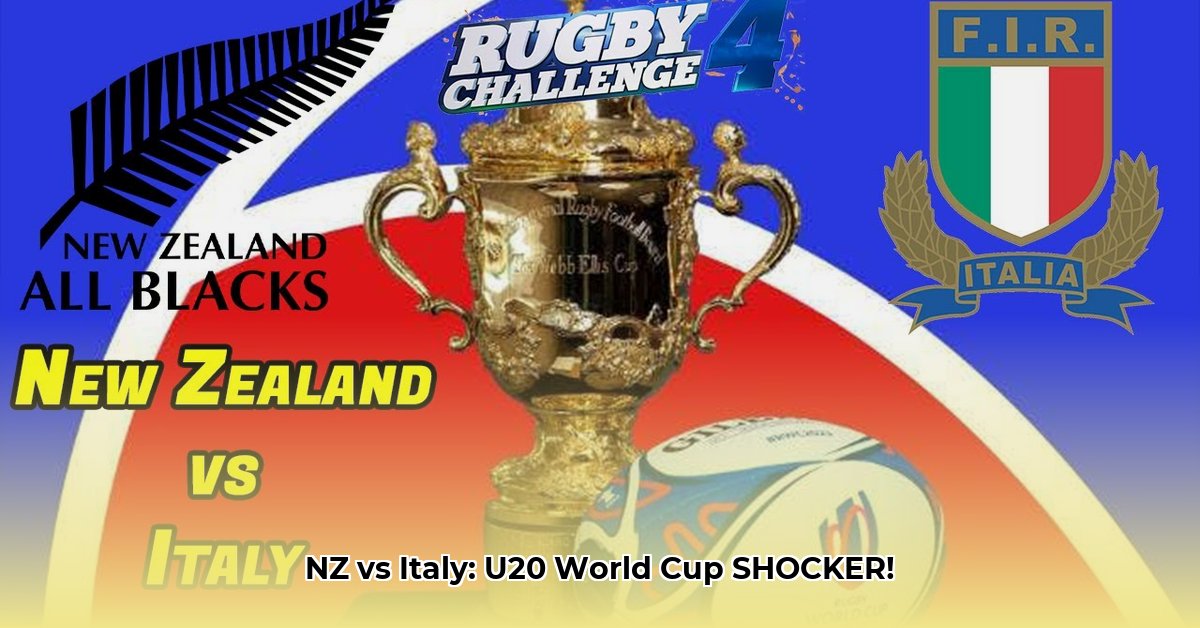
A Hard-Fought Victory for the Baby Blacks
The opening match of the World Rugby Under 20 Championship saw New Zealand's U-20 team snatch a hard-fought 14-5 victory over Italy. While the final score suggests a comfortable win, the reality was a gripping contest, a true test of wills that showcased both the Baby Blacks’ attacking prowess and their defensive resilience, as well as the Azzurrini's growing strength. The match highlighted key areas of strength and weakness for both teams, offering valuable lessons for aspiring U-20 squads worldwide.
The Kiwis began with a bang, showcasing their electric attacking potential. Two early tries—the first a dazzling solo effort from Frank Vaenuku, who sliced through the Italian defence with breathtaking speed—gave them a commanding 14-0 lead. However, this initial dominance was short-lived. Did New Zealand underestimate their opponents? Their early success seems to have lulled them into a false sense of security.
Italy's Scrum Dominance: A Turning Point
Italy, far from being disheartened, responded with a powerful display of scrummaging that completely shifted the game's momentum. Their pack, particularly the imposing Sergio Pellicioli (142kg!), exerted immense pressure, consistently winning penalties against the Baby Blacks. This physical dominance resulted in a stark disparity in penalties conceded: New Zealand conceded an alarming twelve penalties compared to Italy's four. This suggests a significant breakdown in New Zealand's scrum technique and discipline. It was a masterclass in forward play, a testament to their hard work and preparation. Was this a wake-up call for the New Zealand coaching staff? They'll surely be analysing these scrum breakdowns.
A Scoreless Second Half: Tactical Battles
Despite Italy’s scrum dominance, New Zealand's staunch defence kept the Azzurrini at bay. The Kiwis limited Italy to a single try, showcasing a defensive resilience that kept them in the contest. However, their own attack sputtered after the break. The second half was strikingly different from the first, a scoreless period that left many wondering about the tactical adjustments, or lack thereof. Was it fitness, strategic errors, or a combination of both? This second half performance certainly raises questions. Perhaps a lack of tactical adaptation cost the New Zealanders a more convincing victory.
Areas for Improvement: Tactical and Disciplinary Shortcomings
This match highlighted crucial areas where New Zealand need to improve. The excessive penalty count points to a lack of discipline and game management. This isn't simply a matter of individual errors but a systemic issue requiring immediate attention from the coaching staff. The breakdown play also needs urgent attention, with Italy consistently disrupting New Zealand's attacks. But what about Italy? They might have a powerful scrum, but surely they could capitalise more on their dominance?
Italy's Promise: Riccardo Casarin’s Impact
While Italy's scrum was a key factor, individual brilliance also shone through. Riccardo Casarin’s performance at the breakdown was exceptional, consistently winning crucial turnovers. His contributions highlighted the Azzurrini's potential, suggesting they will be a force to be reckoned with in the remaining matches. This was a definite highlight for the Italian side. Perhaps with better finishing, their victory wouldn't have been so hard to achieve.
Key Takeaways and Future Implications
This match offered invaluable lessons for both teams. New Zealand must prioritise improving scrum technique and discipline while reigniting their first-half attacking flair. For Italy, converting their scrum dominance into more tries is key. This match serves as a valuable benchmark for both teams' progress throughout the tournament. It was a close match, with Italy proving that they are not to be underestimated, leaving a lasting impact on the tournament's dynamics.
Three Pivotal Points:
- New Zealand's explosive start, followed by a second-half collapse. Why the sudden change?
- Italy's scrum dominance as a critical turning point in the match. Could they have capitalised more?
- Individual brilliance (Vaenuku and Casarin) highlighting the importance of both team and individual performances. Could these players have made a greater impact?